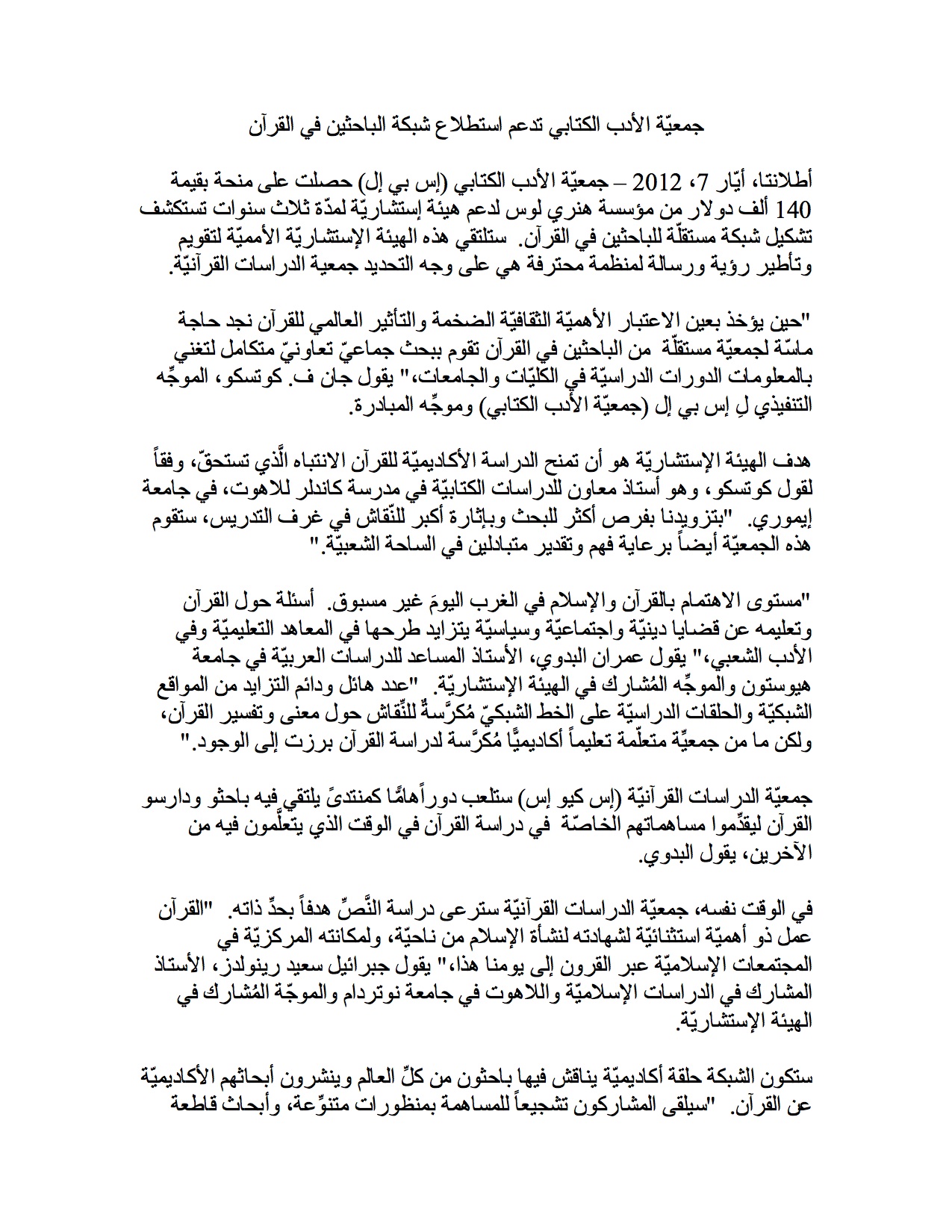Society of Biblical Literature Supports Exploration of Qur’an Scholar Network
SOCIETY OF BIBLICAL LITERATURE SUPPORTS EXPLORATION OF QUR’AN SCHOLAR NETWORK
ATLANTA, May 29, 2012 – The Society of Biblical Literature (SBL) has been awarded a $140,000 grant from the Henry Luce Foundation to support a three-year consultation that will explore the formation of an independent network of Qur’anic scholars. This international consultation will meet to evaluate and frame a vision and mission for a professional organization, namely, a *Society for Qur’anic Studies.
“Considering the enormous cultural importance and global influence of the Qur’an, a pressing need exists for an independent and self-defined association of scholars of the Qur’an to do collaborative research and to enrich and inform courses at colleges and universities,” says John F. Kutsko, executive director of SBL and director of the initiative.
The goal of the consultation is to give the academic study of the Qur’an the attention it deserves, says Kutsko, who is also affiliate professor of biblical studies at the Candler School of Theology, Emory University. “By providing more opportunity for research and by bringing more conversation into the classroom, such an organization will also foster mutual understanding and appreciation in the public square.”
“The level of interest in the Qur’an and Islam in the West today is unprecedented. Questions surrounding the Qur’an and its teaching on religious, social and political issues are increasingly raised in educational institutions and popular literature,” says Emran El-Badawi, Assistant Professor of Arab Studies at the University of Houston and co-director of the consultation. “A vast and ever-growing number of websites and online forums are devoted to discussions on the meaning and interpretation of the Qur’an, but no learned society dedicated to the study of the Qur’an exists.”
A Society for Qur’anic Studies (SQS) would play an important role as a meeting place where scholars and students of the Qur’an might present their particular contributions to the study of the Qur’an, while learning from others, says El-Badawi.
At the same time, an SQS would foster the study of the text for its own sake. “The Qur’an is a work of extraordinary importance, both for its witness to the rise of Islam, and for its central place in Islamic societies through the centuries and still today,” says Gabriel Said Reynolds,
Tisch Family Associate Professor of Islamic Studies and Theology at the University of Notre Dame and co-director of the consultation.
The network will be an academic forum in which scholars from around the world discuss and publish scholarship on the Qur’an. “Participants will be encouraged to share diverse perspectives and cutting edge research on the Qur’an’s language, its dialogue with other scriptures, and the context in which the text arose,” notes Reynolds. “By approaching the Qur’an as an historical, literary and religious text, SQS will demonstrate the extraordinary and wide-ranging scholarly value of the Qur’an.”
“It cannot be overstated that the agenda of the scholars in this consultation will not be determined or directed by SBL,” says Kutsko. He emphasizes that SBL will serve only to provide the logistical support for Qur’anic scholars to foster their work.
“The guiding principle for the consultation is to ensure that scholars of Qur’anic Studies set their own research and publishing agendas, that our colleagues in this discipline have the resources to determine their own future, and that their impact transcends institutional and international lines,” Kutsko says.
“The founding of a new society for the study of the Qur’an will provide an institutional forum for Qur’anic Studies equal to the study of other religious texts and traditions,” says Vincent Cornell, chair of the Department of Middle Eastern and South Asian Studies at Emory University. “This establishes a base for Qur’anic Studies that hasn’t existed before, and thereby makes an important intellectual claim.”
The past two decades have witnessed tremendous growth in scholarship on the Qur’an, says Reynolds. “An annual academic forum on the Qur’an and related publications will allow scholars from a wide range of disciplines a context for collaboration and dialogue. It also will give students and informed members of the public access to a common forum where they will learn from and contribute to this rich discussion.”
###
For an Arabic version of this news release, please see below.
The Society of Biblical Literature, founded in 1880, is the oldest and largest learned society devoted to the critical investigation of the Bible from a variety of academic disciplines. As an international organization, the Society offers its members opportunities for mutual support, intellectual growth and professional development and is a member of the American Council of Learned Societies.
The Henry Luce Foundation, established in 1936 by Henry R. Luce, seeks to bring important ideas to the center of American life, strengthen international understanding, and foster innovation and leadership in academic, policy, religious and art communities.
*The Society for Qur’anic Studies (SQS) is now the International Qur’anic Studies Association (IQSA)


